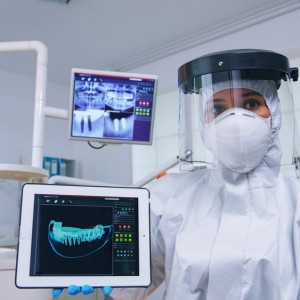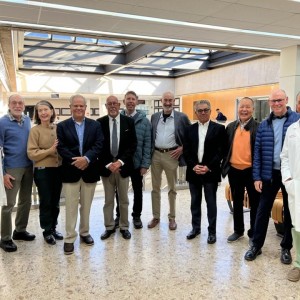
ADA advises dentists to be on alert for internet security risks
Federal agencies warn of possible cyber incidents in wake of Russia’s attacks against Ukraine
The American Dental Association is advising dentists and their staffs to be on the alert for possible internet security risks in the wake of Russia’s attacks against Ukraine.
Cyber security experts are urging people to be aware of a possible increase in cyberattacks against the United States. The Cybersecurity and Infrastructure Security Agency and Federal Bureau of Investigation have warned attacks against organizations in Ukraine “are likely to occur and may unintentionally spill over to organizations in other countries,” according to a news release.
The two agencies issued a joint advisory on Feb. 26 detailing ways organizations can help detect and protect their networks from destructive malware. While the advisory said there is "no specific, credible threat to the United States at this time, all organizations should assess and bolster their cybersecurity."
Both agencies recommended the following immediate actions people can take to help strengthen and protect their data, such as:
• Enabling multifactor authentication when there is remote login capability.
• Setting antivirus and antimalware programs to conduct regular scans.
• Enabling strong spam filters to help prevent phishing emails from reaching end users.
• Updating software.
• Filtering network traffic.
The ADA recommends that dental practices protect themselves from cyberattacks by following good internet security practices, such as keeping systems up to date with security patches and making sure antivirus signature files are current. The Association also recommends dental offices have multiple recent backups, and that backups are disconnected (inaccessible) from those systems.
The ADA notes that cyber attackers can gain a foothold inside networks via phishing emails, so this is a good time to remind dental teams and staff about the danger of phishing emails.
The ADA also wants dentists to be aware that scammers may sometimes exploit current events to trick people into sending them money or sensitive information. For example, according to the FBI, scammers leveraged the COVID-19 pandemic to steal personal information and money through phishing scams, such as fake CDC emails and emails with links purporting to enable an individual to donate to a charity online.
The FBI has a webpage devoted to spoofing and phishing filled with tips to help dentists and small business owners protect themselves. The Federal Trade Commission also has several resources available at FTC.gov/cybersecurity. For additional resources, visit CISA's ransomware guidance and resources webpage, the FBI's ransomware webpage and the HHS Office for Civil Rights' Fact Sheet: Ransomware and HIPAA.
The ADA also offers tips on protecting dental practices, including a free online course worth one continuing education credit. Visit ADA.org and type in “ransomware” to access all the Association’s resources.
Source: www.ada.org
 Related articles
Related articles
The Blind Spot 08 June 2022
Dental Lifeline Network seeks volunteers for its Donated Dental Services program
Dental Lifeline Network’s Donated Dental Services program provides comprehensive donated dental treatment to vulnerable individuals with disabilities or who are elderly or medically...
ADA, American Student Dental Association host first in-person Lobby Day since 2019
“We are always at our strongest when we come together — united in shared passion and purpose and in our advocacy.”ADA President Cesar R. Sabates, D.D.S., was all smiles at the podium at the...
As COVID-19 cases decline and restrictions lift across the U.S., recovery of the workforce remains incomplete, according to research from the ADA Health Policy Institute.More dentists are retiring...
The Blind Spot 06 April 2022
American Board of Orofacial Pain recognized as national certifying board for orofacial pain
The National Commission on Recognition of Dental Specialties and Certifying Boards announced March 28 it has recognized the American Board of Orofacial Pain as the national certifying board for orofacial pain
The recognition comes after the National Commission adopted a resolution based on an application from the American Board of Orofacial Pain to be recognized as the national certifying board for the...
The Blind Spot 30 March 2022
ADA thanks Congress for including oral health priorities in Cures 2.0 Act
Association urges lawmakers to develop future pandemic strategy that recognizes ‘vital’ role dentists play
The American Dental Association is thanking lawmakers for including many oral health priorities in the Cures 2.0 Act.In a March 17 letter to Reps. Diana DeGette, D-Colo., and Fred Upton, R-Mich., ADA...
 Read more
Read more
Digital Dentistry 19 November 2025
Increasing awareness of tooth fracture, both complete and incomplete, as a significant disease entity has led to improved diagnostic techniques.
Editorials 19 November 2025
As Ellen Simmons-Shamrell of the Class of 1977 wrote her annual check for the Michael D. Scotti, DMD Endowed Scholarship—established in memory of her late classmate—she reflected on how different...
Products 19 November 2025
Smartee Denti-Technology has unveiled the Smartee Digital Orthodontic Technology Exhibition Hall, a 1,200-square-meter space dedicated to showcasing the company’s innovations in clear aligner...
News 19 November 2025
Coupa, the global leader in AI-powered spend management, today announced a new collaboration with Specialized Dental Partners, a premier dental support organization (DSO) dedicated to enabling its...
News 19 November 2025
Breakthrough T1D has been selected as a 2025 Health Access Hero Award grant recipient by Sun Life U.S. and DentaQuest.















